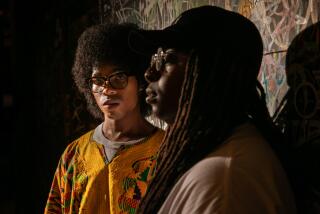Injured and cold, she drew on her animation skills
- Share via
The gig: Creator of “The Zula Patrol,” a Saturday morning cartoon watched by 2 million children a week on NBC and public television stations, and Zula World, an online hangout for kids built by IBM Corp. In Los Angeles, the show airs Saturday mornings on NBC and Monday mornings on KCLS public television.
First career: Manchester, 52, was an audiologist in Ohio for 15 years.
Eureka moment No. 1: In 1994, she sold her audiology practice and enrolled in a two-year animation program at Ohio State University. “I always told myself that if I stopped having fun with my job, I’d become an animator.” It took 11 years after making the career switch until her first show aired.
How she came up with Zula: While in animation school, Manchester tore her left Achilles tendon and was in a cast for six months. She tried to find a cover for her cast that would keep her exposed toes warm in the winter. Finding none, she decided to design and sell one. She contracted with a textile manufacturer to produce the covers, which she sold to pharmacies and medical supply shops. The covers for kids sported friendly alien creatures she had designed.
She wrote a children’s book to go with the covers. In 1999, she took it to a book fair in Los Angeles, where she met three television producers scouting for new properties. One hooked her up with Phil Roman, executive producer of “The Simpsons” and “King of the Hill.” Roman encouraged her to create a demo. She made two, each 15 minutes long, which she pitched to network executives for the next two years.
The low point: All the networks rejected her. “The early rejections were heavy blows. But honestly, they just made me dig in deeper and work harder. A lot of times, people look at a roadblock and think it’s the end of the road when it’s not.”
How she dug out: Between 2000 and the fall of 2005, when her show debuted on public television, she visited more than 100 schools to get feedback from students and educators. She also pitched her show to science museums. Two of them, the Adler Planetarium in Chicago and the Center of Science and Industry in Columbus, Ohio, used her cartoons in their children’s programs.
To scrape by, she made money designing websites and working as a part-time audiologist.
The big break: In 2002, American Public Television said it would distribute her show if she could get the funding needed to make the episodes.
Manchester landed a fellowship in 2003 with Springboard Enterprises, a nonprofit group that helps female entrepreneurs connect with investors.
After spending six months developing a business plan and fine-tuning her pitch, she made a 10-minute presentation at a Springboard event in Chicago that caught the eye of the proverbial “someone who knew someone.”
Her benefactor, who wishes to remain anonymous, was also a supporter of the Adler Planetarium.
“Usually children’s shows are funded by numerous entities. It makes producing the show difficult from a creative standpoint. By the time your show gets done, it’s a watered-down version of what your vision was.”
Her benefactor took the opposite tack.
“He left me with complete creative control. He told me, ‘If you succeed, it will be your success. If you fail, it will be your failure.’ That’s been incredibly helpful.”
What next: Manchester anticipates that her company will be profitable this year for the first time. She’s teaming with IBM for this month’s launch of Zula World, a subscription website where children will be able to explore and learn about science topics as diverse as tide pools and tundras, atoms and asteroids.
--
More to Read
The complete guide to home viewing
Get Screen Gab for everything about the TV shows and streaming movies everyone’s talking about.
You may occasionally receive promotional content from the Los Angeles Times.






